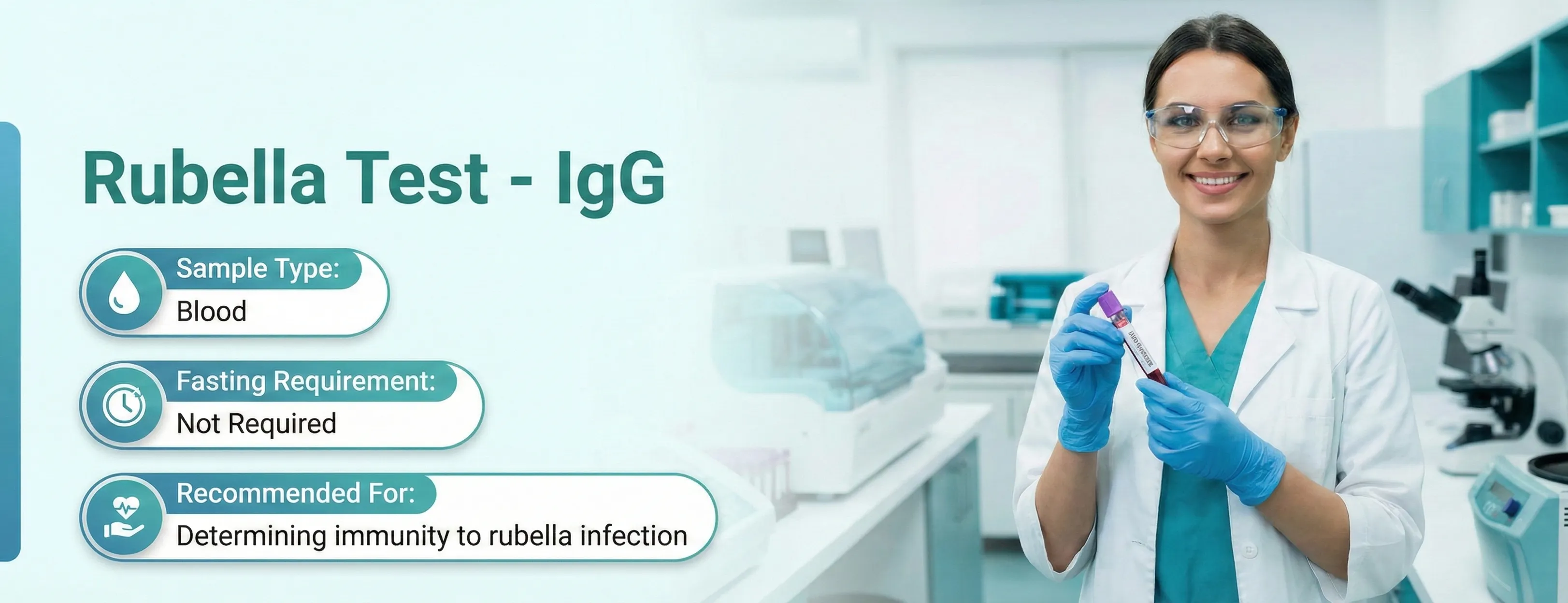176+ orders placed in your location
100% NABL & ISO Certified Lab • 100% Accurate Reports
Rubella Test - IgG
Rubella Antibody Test, German Measles Antibody Test, Hemagglutination Inhibition (HAI) Test
- SummaryThe Rubella IgG test checks for IgG antibodies in the blood to determine immunity against rubella (German measles), usually due to past infection or vaccination. It is commonly done during pregnancy or pre-conception screening. The test is performed using a blood sample, and fasting is not required.Read more
- Reports Within26 HrsView Sample Report100% NABL & ISO Certified Labs
- SampleBlood
- AgeAll Age Group
- GenderMale and Female
- FastingNot Required
PharmEasy Promises
Know More About The Test
A quick info on Rubella - IgG Test
Overview
The Rubella IgG test is a blood test that is helpful in the detection of the rubella virus, also known as the German measles. The test detects the presence of IgG antibodies against the rubella virus in the blood that is suggestive of a past infection.
In the majority of people, it is found to cause mild fever and rash that recede in a few days. Most commonly, children are vaccinated for it with either the measles-mumps-rubella or chickenpox shots.
The rubella virus is a member of the Togaviridae family. The virus is transmitted through the respiratory tract, following which it replicates in the nasopharynx and multiplies in the cervical lymph nodes. The incubation period of the disease-causing virus is 2 to 3 weeks, following which symptoms begin to appear.
The condition can get quite serious in pregnant women. If pregnant women contract rubella during the first four months, it could hugely impact the baby. The child could be born with Congenital Rubella Syndrome (CRS), leading to auditory, ophthalmic, and cerebral defects for life. Infection in pregnant women can also lead to stillbirths and miscarriages.
Rubella was quite common in India earlier in the 21st century. Approximately 40 to 45 per cent of pregnant women are susceptible to rubella. Also, more than 2 lakh babies are born with defects due to rubella infection in India. India had initiated the world’s largest Measles-Rubella (MR) Campaign in 2017 that targeted 410 million children aged between 9 months to 15 years for vaccination. This reduced the prevalence of rubella infections significantly.
Sample Type
The Rubella IgG test is done using a blood sample. The blood sample is collected mostly from a vein in the arm of the individual getting tested or from the umbilical cord of a newborn.
Risk Assessment
Genetic defects in newborns, Miscarriages, Stillbirth
What does this test detect?
The rubella IgG test determines the presence of IgG antibodies in the blood indicative of rubella infection.
The Rubella IgG test can be undertaken by the following persons:
- A woman who is planning to have a baby or is pregnant.
- A newborn whose mom had a rubella infection during her pregnancy.
- A newborn with congenital disabilities can be caused by a rubella infection.
- Any individual with rubella infection symptoms.
- Healthcare workers who are exposed to rubella infections but are not vaccinated against it.
Indications for Rubella Test - IgG Test
A few of the common symptoms associated with rubella infection are:
- Mild fever
- Rash that first affects the face and neck and then moves further down the body
- Runny or blocked nose
- Joint pain
- Swollen lymph nodes
The test is most commonly prescribed for pregnant women and newborns. However, it is applicable for individuals of all age groups.
How frequently should you take this test?
Women are advised to undergo the Rubella IgG test to determine immunity against it. Before pregnancy, women must undergo the test to ensure they are immune to rubella infections. If during pregnancy, any of the signs or symptoms of a rubella infection are present, then patients need to undergo the test. Newborns suspected to have contracted the disease during the pregnancy or having congenital disabilities are also prescribed the test.
Since it is a test to determine the presence of an infection, patients are required to undergo the test only when detection is needed. No annual tests are required, so there is no fixed frequency of the test.
Test Preparation
Before the Test
Generally, no preparation is mandated for a Rubella IgG test. However, if this test coincides with another that requires certain measures, your healthcare provider may advise you to refrain from consuming specific food items. It is advisable to always seek guidance from your doctor prior to the test for optimal results.
During the Test
A small sample of your blood will be extracted from a vein in your arm. Here are the key aspects to anticipate during the test:
- The region where the needle will be inserted will be disinfected with an antiseptic.
- A tourniquet band will be applied to your arm to enhance vein visibility.
- A needle will be introduced into the vein to draw the blood. This may cause a brief pinching sensation lasting a few seconds.
- The blood will be collected in a vial or small test tube and the blank label will be filled with your details.
After the Test
Following the blood collection:
- A bandage will be affixed to the puncture site to prevent bleeding.
- Minor bruising is common. An uncommon effect is lightheadedness. You should sit for a few minutes if you feel dizzy.
- Contact your healthcare provider in case of bleeding, pain, or rashes at the puncture site.
Parameters
The Rubella IgG test determines the presence of the IgG antibody against the rubella virus in the blood. The presence of IgG antibodies in the blood indicates either a past infection with rubella.
Another test, the rubella IgM antibody test, only helps to determine recent infections with the rubella virus by detecting the presence of IgM antibodies in the blood.
Ranges
|
Range of IgG in the blood (IU/ml) |
Result interpretation |
|---|---|
|
10 IU/ml of blood or higher |
This indicates a positive result. That means individuals with these scores show the presence of rubella antibodies in the blood, which suggests they had a past history of rubella infection. |
|
7 IU/ml of blood or lower |
This indicates a negative result. That means that individuals with this score have too few rubella antibodies, suggesting that rubella infection has not occurred. |
|
8 or 9 IU/ml |
This indicates that the individual had just received the vaccine for rubella, and the antibodies have not yet begun to develop. |
The results of the test depend on factors such as age, gender, the method used for the test, and health history.
The normal values and reference ranges of the test may vary from lab to lab. Please refer to the ranges mentioned in the report and consult a doctor to understand the interpretation of lab reports.
Test Result Interpretation
The main component of the Rubella IgG test is the presence of IgG antibodies in the blood. The IgG antibodies develop in the blood due to a previous infection with rubella.
Although the rubella infection is not very severe in most people, it can turn quite adverse in pregnant women and lead to genetic defects in newborns when the mother has the disease during pregnancy.
A positive result indicated by a higher level of IgG in the blood demonstrates a recent infection with the rubella virus. In comparison, a negative result indicated by a lower level of IgG in the blood demonstrates that rubella infection has not occurred. However, a mid-level result determines the individual has taken the rubella vaccine recently, and antibodies have just started to develop.
Rubella infection can also be controlled through vaccination. The rubella vaccine is a combination vaccine known as MMR, which stands for measles, mumps and rubella. All three are common viral illnesses and can be vaccinated against with a single vaccine.
Two doses of the vaccines are administered to children after birth to eliminate any further chances of infection. The first dose is administered when they are 12 to 15 months of age, while the second is administered at 4 to 6 years.
Risks and Limitations
The Rubella IgG test is a commonly done blood test with rare risks of complications. See your doctor if you notice:
- Persistent bleeding at the site of needle-insertion.
- The skin where the needle went in becomes red, swollen, or hurts.
Limitations of the test
- The accuracy of the test could be affected due to equipment or human mistakes.
- Misinterpretation of the markers leading to inaccurate reports.
Was This Test Information Helpful?
Please rate your experience
References
People Also Ask
Why is my rubella IgG high?
What is the normal range of rubella IgG in pregnancy?
Why is rubella tested during pregnancy?
What is the rubella virus in pregnancy?
Can rubella cause miscarriage?
Popular Tests
Have any doubts? Ask us.
Ask us anything about the Rubella Test - IgG to understand it better
We provide trusted, expert-curated health content to support better awareness,prevention, and care.
Backed by experienced doctors, medical experts, and strict editorial standards.


